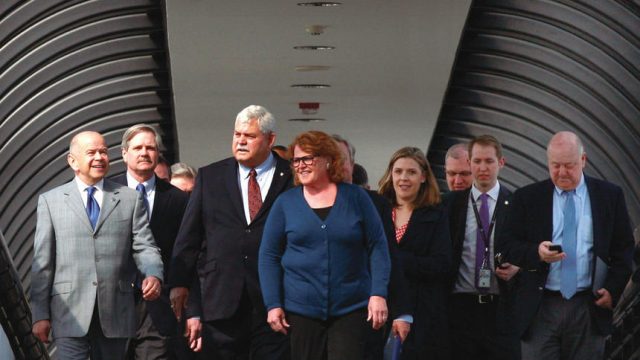Where Are North Dakota’s Senators on the Dakota Access Pipeline Controversy?

FAA Administrator Michael Huerta, left, joins U.S. Senators John Hoeven and Heidi Heitkamp and Bruce Smith, Dean of the John D. Odegard School of Aerospace Sciences and other officials on a tour of UND's aerospace facilities Monday during Huerta's first visit to North Dakota to announce that North Dakota will be the first of the six UAS test sites nationwide to begin operations. photo by Eric Hylden/Grand Forks Herald
The Dakota Access Pipeline imbroglio is perhaps the biggest political news story in North Dakota this year.
The pipeline itself represents vital infrastructure for North Dakota’s oil industry for which high transportation costs is a competitive disadvantage. Put simply, the pipeline (or lack thereof, as the case may be) impacts a lot of jobs.
The political battle over the pipeline has also created a rift between the Standing Rock Sioux tribe and the State of North Dakota. When Governor Jack Dalrymple called out the National Guard to buttress law enforcement’s response to the often unlawful and sometimes violent protests it was the first time the state had taken such measures since the 9/11 attacks when the Guard helped with airport security. Prior to that the North Dakota National Guard hadn’t been called out by the Governor in a law enforcement/security capacity since the infamous 1969 “Zip to Zap” incident.
The point I’m trying to make is that this legal and political battle over the pipeline is a big deal. A really big deal.
So where then are our U.S. Senators? Outside of a few vague, milquetoast comments to the media about the protests Senators John Hoeven and Heidi Heitkamp have been largely silent.
Last week, when the Obama administration bigfooted a federal judge’s opinion siding with the pipeline and ordered a halt to it anyway, Senator Heitkamp put out a mealy-mouthed statement saying she would “press the Administration and various agencies” for finality on the issue, though she didn’t communicate what final outcome she’d prefer.
For someone who rode into federal office in 2012 touting herself as both a champion of Native American causes and a defender of North Dakota’s energy industry from federal overreach, the statement was underwhelming.
But she did better than Senator Hoeven who didn’t even bother to put out a statement about the federal court ruling or the Obama administration’s meddling. Not one I can find on his website or in my email inbox, anyway.
This is enormously troubling. Our U.S. Senators represent the State of North Dakota in Washington D.C.
The Dakota Access Pipeline – at least the portion of it involved in this dispute – is explicitly a federal issue. It involves relations with a federally-recognized tribe and the crossing of property regulated by the U.S. Army Corps of Engineers.
Our Senators, whatever their positions on the pipeline, should be on the front lines of this debate.
I can understand, though I don’t condone, why Senator Heitkamp has been something less than visible on this issue. That’s a political calculation. This debate pits energy interests against the tribes, and neither are a constituency she can afford to alienate if she hopes to be re-elected in 2018.
But where in the world is Senator Hoeven? The state needs his leadership, and he’s been invisible.
Meanwhile, Congressman Kevin Cramer has been outspoken on the pipeline. He issued this statement last week after the federal court ruling and President Obama’s subsequent actions:
“It seems more than a little confusing that moments after a federal judge issued an order stating, among other things, that the Corps of Engineers and the pipeline company did everything the law requires of them and more, the Obama Administration decides to change the rules. If this was the intent all along, they should have said so before the events of the last several weeks. They could have spared a lot of heartache and cost. Their decision today does nothing to ensure certainty or calm, but rather adds further confusion. It is fundamentally unfair to change the rules after the game. It is incumbent upon all parties to move forward peacefully and expeditiously, within the law, to come to a resolution that honors the rights of lawful commerce.”
Say what you want about Cramer, but he’s rarely ambiguous on any given political issue.




